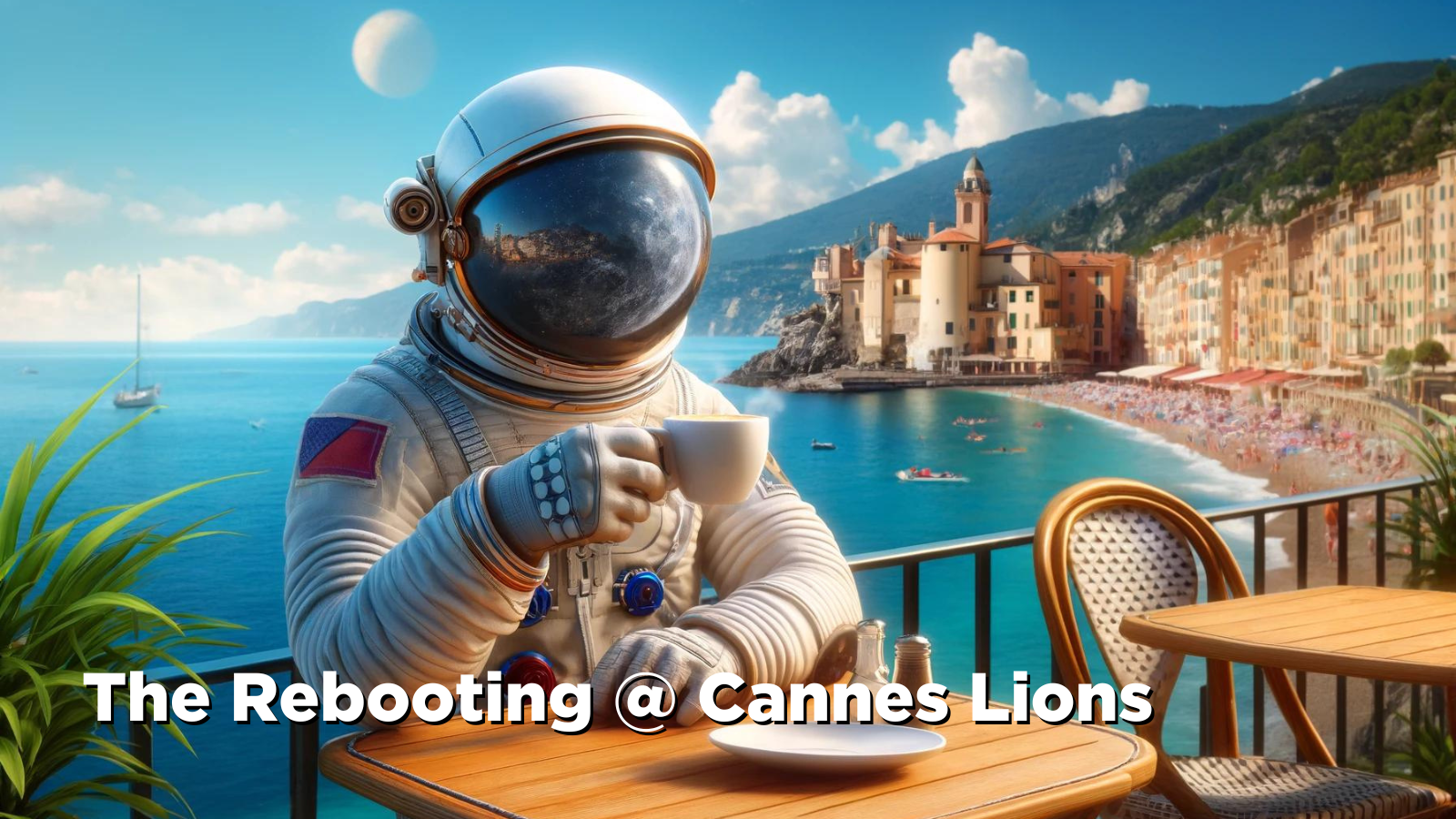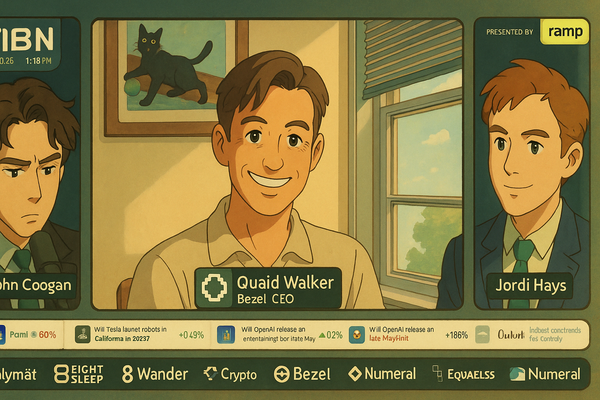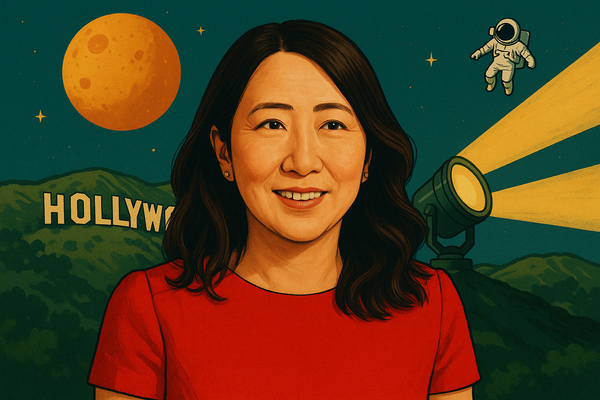Digestifs
Cannes takeaways

Welcome to my final Cannes dispatch. The crowd thins out as the week stretches on. This didn’t used to be the case. Back when Cannes was still primarily an advertising awards show, the week culminated on Saturday, when the “film” awards were given for the best TV commercial. That would warrant fireworks over the sea. That's been replaced by a drone light show from ad tech company Kargo. Times change.
Big thanks to my partners at Cannes this week: Permutive, EX.CO and Outbrain. Over the course of the week, we did two private dinners, several podcasts and sessions, as well as a couple cocktail parties. I thought that was a lot, until Axios’s Sara Fischer told me she participated in 22 sessions – and did prep calls for 21. (Our podcast yesterday with Dotdash Meredith CEO Neil Vogel was the exception.)
To wrap things up, I have five big takeaways from the frenetic week. First a message from Onyx by Outbrain.

Reimagine your brand impact with attention metrics

Advertisers are increasingly harnessing attention metrics, with a DoubleVerify survey revealing almost 96% adoption in recent buys. High-Attention Unit (AU) media has proven to enhance campaign performance significantly. Onyx leverages these insights, offering data-driven solutions that align with this sustainable and effective approach. By prioritizing high-AU experiences, Onyx helps brands achieve notable lifts in both awareness and conversion, ensuring that every ad dollar is spent where it counts the most.
Connecting dots on the Croisette

Another Cannes is in the books. It was a typical whirlwind week of meetings, serendipitous run-ins, dinners, podcasts, cocktails and lots and lots of talking. I find private conversations far more informative than the panel recaps you tend to read about in Cannes wrapups. Here's my takeaways from the week.
Cannes is too decentralized. The heartbeat of Cannes used to be the Palais. It housed the award shows, conference sessions and workshops. It was also where attendees would go to see “the work,” watching the best advertising from around the world. The sins of Cannes at that point were more its pretension, with creative directors parading around with golden statues, wearing fedoras and those white sunglasses. The big parties were put on by production companies, not tech platforms.
Cannes has morphed. It followed the money. No shame in that. It seems to have attracted more people than ever. The official numbers from the organizers are difficult to go by since a vast number of people do not buy an official pass. Instead, they spend their time going to the innumerable fringe events at various hotels and villas. The theater at the Palais is just one option.
This has led to simply far too much programming. Cannes is a place where four top CMOs or CEOs will talk to an audience of a dozen people. The programming itself is mostly innocuous. Cannes is where people tend to keep things at 30,000 feet and push some kind of soft messaging around purpose – or push some kind of data-enablement tool. The sessions rarely break new ground, usually serving as an excuse for convening. The real value for attendees is typically in the cocktail party following the session rather than the actual session. That’s a reality for a lot of media.
Publishers need to adapt. The smoke-and-mirrors era of publishing is over. Digital media gave birth to too many flimsy brands that growth hacked their way to supposedly big audiences. That’s because the incentives of the system were to grab fleeting impressions rather than do the hard yards of building loyalty. This isn’t some kind of moral failing of publishers. These incentives were set by others: tech platforms that control the distribution and marketers who control the ad spending. Pretty much any issue with the digital media ecosystem can be laid at the feet of those two parties.
The incentives are changing as the priorities of these two constituencies have changed. Marketers are more often obsessed with precision and verifiable return on ad spending. Back when Cannes was still the preserve of fedoras, I would not have expected grocery stores to be here as big ad sellers. But here we are. The fast growth of retail media is a sign of how much the ad industry has changed.
Google is walking away from its bargain that it would crawl sites and scrape some their content for search results pages they’d monetize with ads and in return it would distribute traffic to websites, which in turn would make money by using Google’s ad tech. It was always an imperfect bargain, but it roughly worked. Under competitive pressure, Google is changing the incentives.
During a podcast recording at the Dotdash Meredith villa, Neil was very matter of fact about his view that publishers need to stop complaining and adapt. The deals with AI companies are irksome, sure. These companies by and large engaged in a wholesale theft of content. They’re not so much as asking for forgiveness but for acquiescence. I can’t blame a publisher for taking the money instead of taking some kind of high-minded stance when, as Neil points out, the landscape will likely shift dramatically within 18 months. Better to F around and find out.
I have asked several publishers this week what their businesses look like in five years. None have attempted to give a coherent answer. This isn’t a business for everyone. You have a much better shot if you’re resilient and adaptable.
Welcome to commercetopia. The test of a publishing brand is their ability to get their audiences to take actions. Cranking out content to put ads around is a tough business. The competition for attention in the Information Space is intense, and AI tools will flood the system with a tsunami of crap. The hope is that high quality content will become more valuable. Hopefully.
But like Cannes, the content itself will play a different role. In many media models, the content will serve a top of the funnel role to build brand awareness and loyalty and collect audience data. Publishers can’t afford to stay in that part of the funnel. I did a couple podcasts at the Hearst House yesterday. It was emblazoned with a banner reading “own the funnel.” Publishers will need to move down the funnel.
Advertising and commerce are blurring. Again, I go back to retail media. One feature of Cannes is companies wrapping the cars and vans that shuttle people around to villas and other locations. A Criteo van passed me yesterday promising “commercetopia awaits.” The heft of advertising, both in Cannes and overall, has shifted from Thai dish-soap TV ads that make you cry to closed-loop attribution fueled by shopping data. The pendulum has undoubtedly swung too far to performance marketing, but the blurring of advertising and commerce will accelerate.
Convening power is critical. Driving sales isn’t practical for many media brands. Instead, many will lean on being able to use their brand power to convene people. It doesn’t take long in my conversations with top publishers to hear about their events strategies. They’re a critical part of a modern publishing “stack.” Content is just one part, usually at the top. Gone are the days when events and activations are a side hustle.
This isn’t new. But I felt years ago many publishers were being dragged into this space, grumbling about the margins being worse and how events aren’t scalable. Existential crisis can do away with those kinds of concerns. Ads are still going to pay a lot of the bills at publishers, and subscriptions for certain kinds of content are now critical. I expect publishers will continue to push into events. It’s far more attractive to compete on this level than to try to outdo tech companies with micro-targeting.
AI isn’t what’s ailing publisher businesses. We have a human tendency to look to blame others for our own travails. External challenges are handy. Publishers face an array of challenges, but the AI challenge is still mostly looming. The issues in these businesses are not because of AI. They’re related since Google is shifting its business and product strategies as part of an AI arms race.
In our conversation yesterday – it’s coming as a podcast on Tuesday – Neil said Dotdash Meredith hasn’t seen an impact to its traffic from AI specifically. Instead, AI is just another scraping tool. The bigger impact to publishers like DDM has been Google’s decision to prioritize Reddit and user-generated content over professional content in the name of “authenticity.” The AI Overviews that are not plastered to the top of many results pages are just a different implementation of the "answer box" Google would give by scraping content from publishers.
None of this is a case for complacency. Publishers will continue to need to restructure their businesses. I don’t wish for anyone to lose their job. It’s a terrible experience, although also somewhat inevitable – I’ve had it happen twice. Publishing organizations will be leaner. They simply have to in an environment where they are competing with super-empowered individuals with radically different cost structures, not to mention tech and retail media platforms that have the leverage of software models. Silicon Valley sets the pace for business trends, and flatter organizations will become the norm, accelerated by AI as an enabler of more-with-less business strategies.
Thanks for reading all week. I’m now in awe of the newsletterers who publish daily. Send me a note with feedback by hitting reply.




